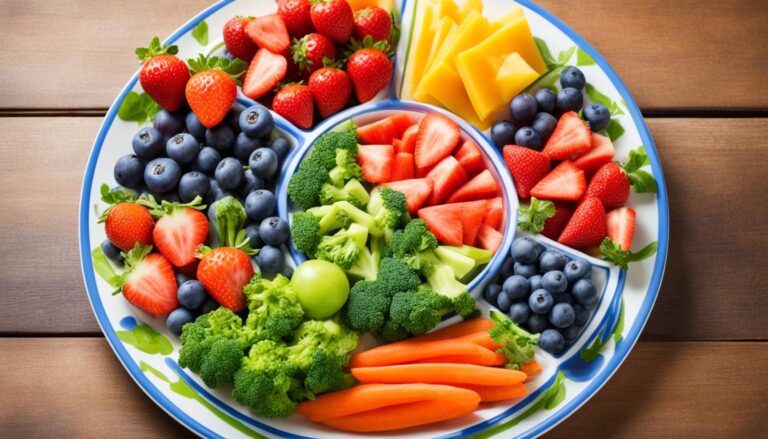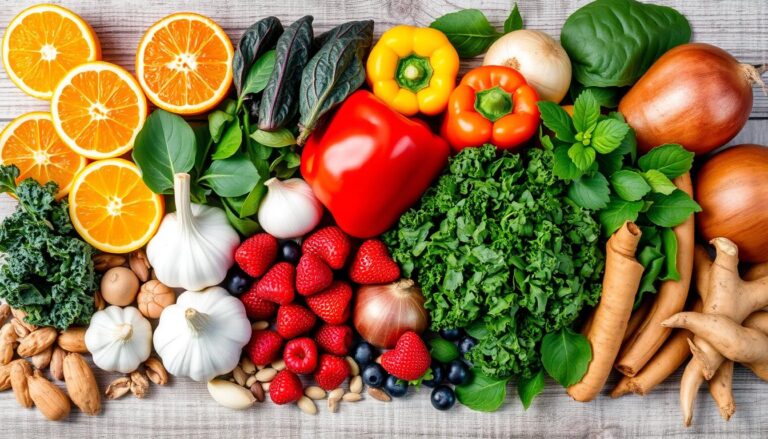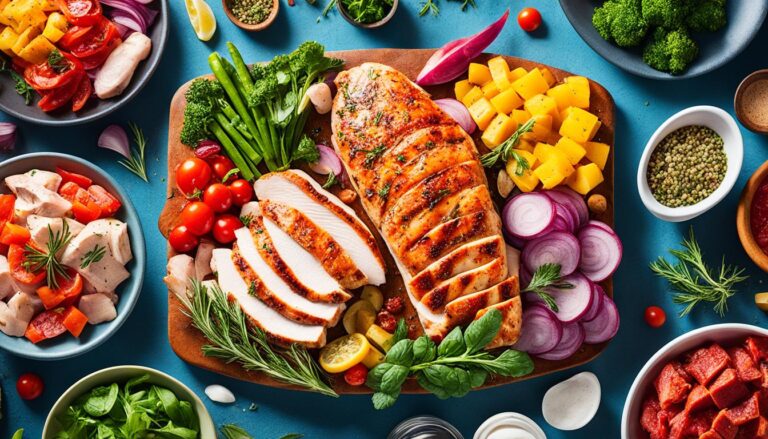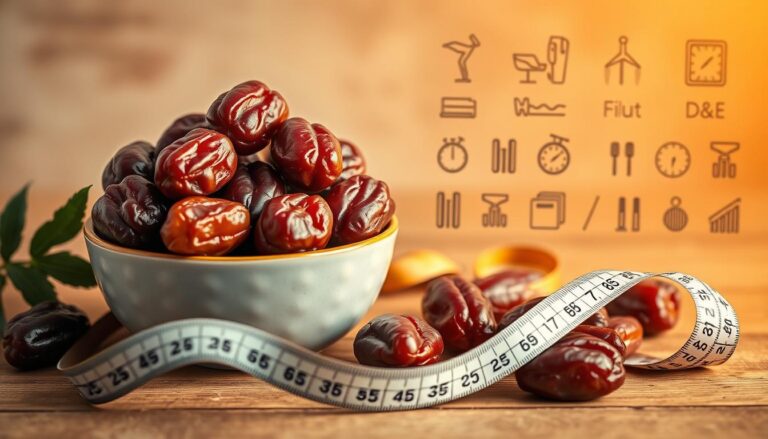Start a tasty journey with us as we show you how to follow the keto diet. Imagine eating rich creamy fats and enjoying your favorite proteins.
At the same time you’ll lose weight and get healthier. But what foods can you eat on this plan? Get ready to learn about low carb foods, high-fat foods keto friendly vegetables and healthy fats that make the keto diet great.
Key Takeaways
- The keto diet emphasizes high fat and very low-carb eating plans.
- A wide variety of nutritious foods can be enjoyed on the keto diet including animal proteins, dairy vegetables and healthy fats.
- Keto friendly foods include meats fish eggs dairy nuts seeds, and low carb vegetables.
- Carbs are typically limited to 20-50 grams per day on the keto diet with some people counting total carbs and others focusing on net carbs.
- The keto diet’s potential benefits include weight loss, blood sugar control, and improvements in certain health conditions.
What is the Keto Diet?
The ketogenic diet is a diet high in fat moderate in protein and very low in carbs. This mix puts your body into a state called ketosis. In ketosis, your body uses fat for energy instead of carbs.
Originally the keto diet was used to help children with epilepsy. Now, people are interested in it for other health issues like neurological disorders cancer diabetes, PCOS obesity high cholesterol, and cardiovascular disease. Many also follow it to lose weight.
| Macronutrient | Percentage of Total Daily Calories |
|---|---|
| Carbohydrates | 5-10% |
| Protein | 10-20% |
| Fat | 70-80% |
The ketogenic diet limits carbs to 20-50 grams a day. This low carb intake makes your body use fat for energy, entering a state of ketosis.
Individual carbohydrate intake on the keto diet can vary from 10 to 60 g per day depending on the individual says Dority.
The low-carb high fat diet of the keto diet helps with weight control, blood sugar and health. But always talk to a healthcare professional before changing your diet.

High Protein Foods for Keto
On a keto diet, eating high-protein foods is key for keeping muscle mass and health up. You can find many tasty keto-friendly protein sources in fish seafood, lean meats and poultry. These foods are great for adding protein to your meals.
Fish and Seafood
Fish and seafood are great for the keto diet because they’re low in carbs and full of omega-3 fatty acids. Fatty fish like salmon mackerel and sardines are almost carb free and pack a lot of protein. Shrimp crab and other shellfish are also good choices, even though their carbs can vary.
| Food Item | Calories | Carbs g | Protein g |
|---|---|---|---|
| Canned Salmon | 117 | 0 | 19.6 |
| Shrimp | 84.2 | 1 | 20.4 |
| Canned Tuna | 109 | 0 | 20.1 |
Meat and Poultry
Lean meats like chicken breast, turkey, and pork tenderloin are top choices for keto. They’re low in carbs and full of protein and vitamins. Just watch out for marinades or sauces that might have carbs.
- Chicken breast 105 calories, 0g carbs, 31.1g protein
- Ground turkey 173 calories, 0g carbs, 23.3g protein
- Pork tenderloin 122 calories, 0g carbs, 22.5g protein
Adding a mix of keto friendly protein sources like fish seafood and lean meats helps you hit your protein goals. It also supports your health on a ketogenic diet.
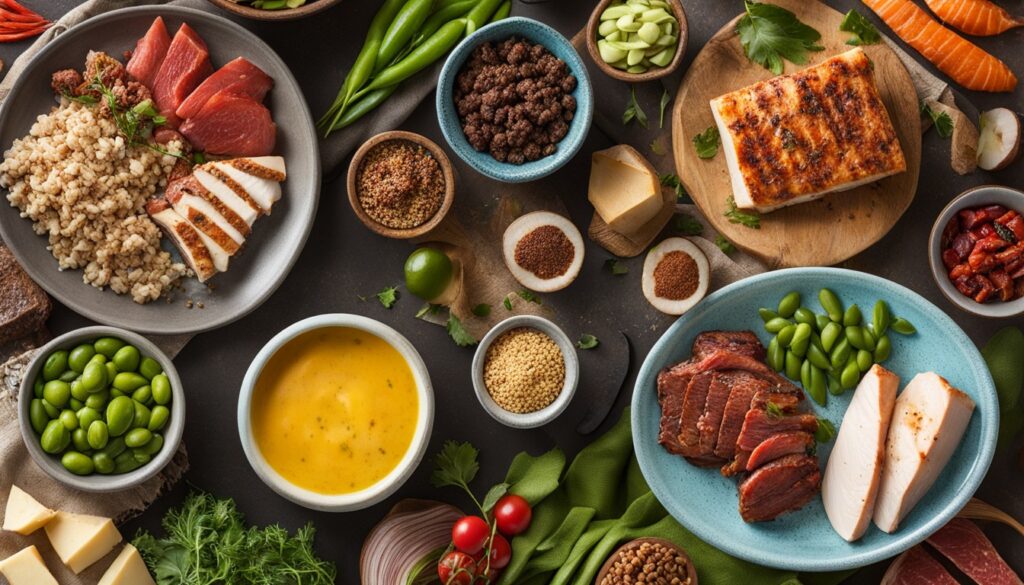
Read more: Lose weight in 2026 without dieting 5 tricks
Keto-Friendly Dairy and Plant-Based Milks
On a keto diet, dairy and some plant-based milks are great for healthy fats and nutrients. High fat dairy like full fat yogurt cottage cheese and cheese are good for your heart and body shape. They fit well with the keto diet.
Cheese is a top choice for keto diets because it’s full of saturated fat but doesn’t raise heart disease risk. Some studies even show it might protect against heart disease. Plus it has conjugated linoleic acid CLA which helps with fat loss and better body shape.
Plain Greek yogurt and cottage cheese are great for keto diets because they’re high in protein and can be eaten in small amounts. Cream and half and half are also good for keto being low in carbs and high in fat. Just remember to use them in moderation.
For plant-based milks, unsweetened soy almond and coconut milk are good for keto diets. But avoid oat milk because it has too many carbs for keto.
| Dairy/Plant-Based Milk | Carbohydrates per Serving |
|---|---|
| Cow’s Milk 1% fat | 12.7 grams per cup |
| Unsweetened Almond Milk | 0.67 grams per 100 grams |
| Unsweetened Cashew Milk | 2 grams per cup |
| Unsweetened Soy Milk | 3 grams per 100 grams |
| Unsweetened Coconut Milk | 6 grams per 100 ml |
| Oat Milk | 5 grams per 100 grams |
Adding high fat dairy and keto friendly plant based milks to your diet gives you many tasty and healthy options. This way you can follow a low carb high fat keto lifestyle easily.

Low Carb Vegetables
Low-carb vegetables are key on the keto diet. They’re packed with nutrients and fit well into a keto friendly lifestyle. Let’s look at some top keto friendly leafy greens and low carb cruciferous veggies to boost your keto diet.
Leafy Greens
Green leafy veggies are low in carbs, perfect for keto. Spinach, kale, and collard greens are full of vitamins and antioxidants. They add nutrients to your meals without raising carb levels.
Herbs like oregano and rosemary add flavor with no carbs. Peppers seen as veggies are also great for keto. They’re full of vitamin C.
Cruciferous Vegetables
Broccoli cauliflower and Brussels sprouts are low-carb cruciferous veggies great for keto. They’re full of fiber and vitamins making them versatile for your meals. Try cauliflower as a low-carb rice or crust.
Summer squashes like zucchini are also good for keto. Zucchini is versatile making low-carb noodles rice, and more. It’s a great base for keto dishes.
| Vegetable | Total Carbs per 100g | Net Carbs per 100g | Fat per 100g | Protein per 100g |
|---|---|---|---|---|
| Zucchini | 3.9 g | 2.7 g | 0.4 g | 1.5 g |
| Cauliflower | 5.3 g | 3.2 g | 0.3 g | 2.1 g |
| Spinach | 1.1 g | 0.4 g | 0.1 g | 0.9 g |
| Bell Peppers | 9 g | 6 g | 0.5 g | 1.5 g |
| Asparagus | 5.2 g | 2.4 g | 0.2 g | 3 g |
Adding keto friendly leafy greens and low-carb cruciferous veggies to your diet offers many nutrient dense low-carb choices. These options will keep you full and satisfied on your keto journey.
What foods can I eat on a keto diet?
The keto diet focuses on high-fat and low-carb foods. By eating 20-50 grams of carbs a day you enter ketosis. Your body then burns fat for energy instead of glucose. This means you can enjoy keto friendly food that tastes great and helps you stay healthy.
For a keto diet eat foods high in protein and fat but low in net carbs. These include:
- Fatty fish and seafood like salmon tuna and shrimp
- Meat and poultry such as beef chicken, and turkey
- High fat dairy products like cheese, plain yogurt and cottage cheese
- Low-carb vegetables like leafy greens peppers, and summer squash
- Avocados, which are high in healthy fats and low in net carbs
- Nuts and seeds including almonds, walnuts, and chia seeds
- Eggs which are a versatile and nutrient-dense keto staple
- High-fat oils like olive, coconut, and avocado oil
- Dark chocolate with a high cocoa content
Some people on keto track total carbs while others focus on net carbs. Net carbs are total carbs minus fiber. This makes it easier to eat more fiber rich foods like berries and leafy greens. Remember everyone’s carb needs can vary based on their activity level and health goals.
But there are foods to limit or avoid on a keto diet. These include grains starchy veggies sugary fruits sweetened yogurt juices honey and syrups chips and crackers, and baked goods. Yet with some planning and creativity you can still enjoy a tasty keto lifestyle.
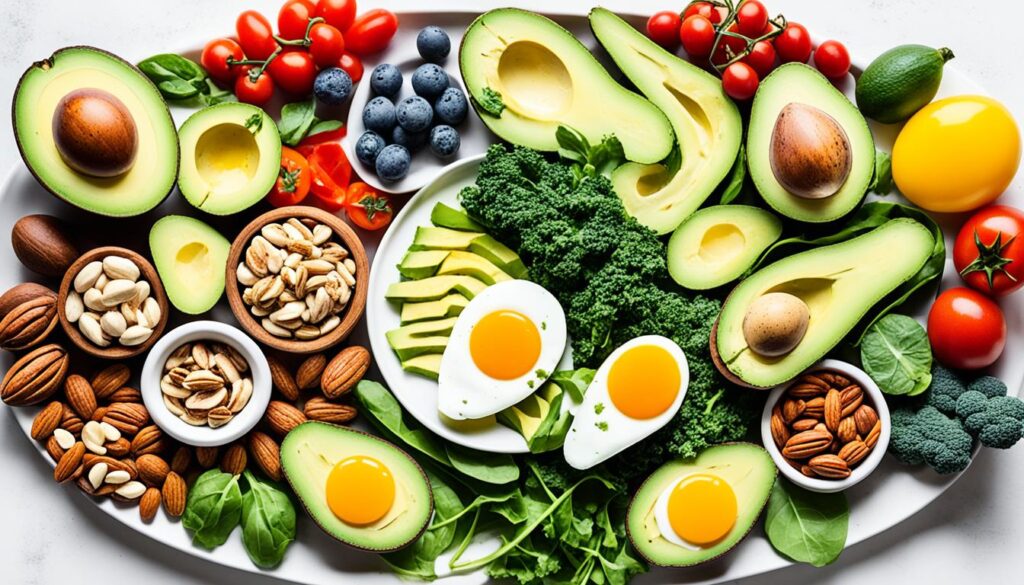
Read more: Boost Your Health with Fruits and Veggies
Keto Friendly Fats and Oils
For those on a ketogenic diet healthy fats and oils are key. Many cooking oils are packed with healthy fats and have no carbs. This makes them perfect for the keto diet. Olive avocado canola nut, and seed oils like flax and hemp oil are great choices.
Olive oil is a top pick because it can help prevent heart disease and some cancers. Olives and olive oil share the same health perks and are low in carbs. Avocado, sunflower, and rice bran oils also stay stable when cooked at high heat.
Avocados are also a good source of healthy fats for the keto diet. They’re high in fat but low in carbs. Eating avocados can lower bad cholesterol and boost heart health.
Keto Friendly Cooking Oils
- Olive oil Rich in heart-healthy monounsaturated fats and antioxidants
- Avocado oil High in monounsaturated fats and antioxidants with a high smoke point
- Coconut oil Contains medium chain triglycerides that may aid in weight loss and ketosis
- Sesame oil Has a medium high smoke point suitable for high heat cooking
- Nut and seed oils Such as walnut flax, and hemp oil provide essential fatty acids
Choosing healthy fats and oils is key on a keto diet. They support health and help you reach ketosis. The right fats fuel the body offer nutrients and have anti-inflammatory effects.
| Oil | Key Benefits | Smoke Point |
|---|---|---|
| Olive Oil | Heart-healthy monounsaturated fats antioxidants | 325-375°F |
| Avocado Oil | High in monounsaturated fats antioxidants high smoke point | 400-500°F |
| Coconut Oil | Contains medium chain triglycerides that may aid weight loss and ketosis | 350°F |
| Sesame Oil | Medium-high smoke point suitable for high heat cooking | 410°F |
| Nut and Seed Oils | Provide essential fatty acids like omega-3s | Varies |
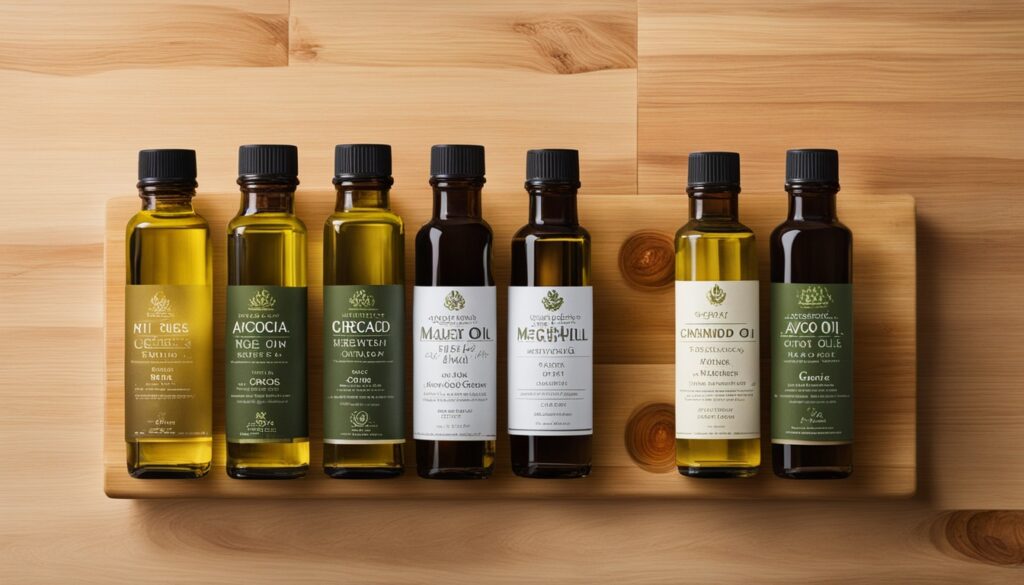
Read more: How Daily Omega-3 Can Boost Your Brain Health
Up to 80% of total daily calories in a keto diet are supposed to come from fat.
Berries and Low Sugar Fruits
Following a keto diet means watching what fruits you eat. Many fruits have a lot of carbs which can stop you from being in ketosis. But there are some keto friendly fruits that are low in carbs and can satisfy your sweet tooth.
Berries are great for a keto diet. For example, strawberries have 7.68 g of carbs but 2 g of fiber, making them 5.68 g of net carbs. Blackberries have 9.61 g of carbs and 5.3 g of fiber, so they’re only 4.31 g of net carbs. Raspberries are even lower, with just 5.44 g of carbs per 100 g.
| Fruit | Carbs per 100g | Fiber per 100g | Net Carbs per 100g |
|---|---|---|---|
| Strawberries | 7.68 g | 2 g | 5.68 g |
| Blackberries | 9.61 g | 5.3 g | 4.31 g |
| Raspberries | 5.44 g | – g | 5.44 g |
Other low-sugar fruits for a keto diet include avocados and olives. Avocados have only 1.83 g of net carbs per 100 g. Olives are also low in carbs and are technically fruits.
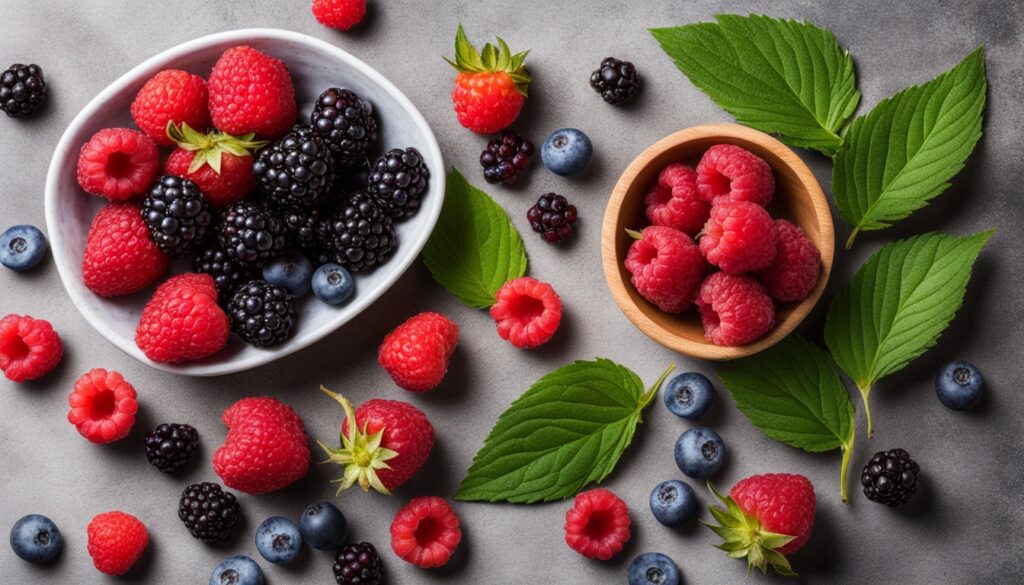
Focus on low-carb berries and other fruits that are low in sugar. By watching your net carb counts for fruits, you can enjoy these keto-friendly options and stay on track with your low-carb diet.
Keto Friendly Beverages
Choosing the right drinks is key on the keto diet. Luckily there are many low-carb drinks that help you stay hydrated and on track. Options include classic coffee and tea and new unsweetened plant-based milks. The goal is to pick drinks that are low in carbs but rich in nutrients.
Coffee and tea are great for keto because they have almost no carbs. Drinking 2-3 cups a day can even lower your risk of heart disease. Tea is full of antioxidants that boost your health.
If you want something more filling, try unsweetened plant-based milks. Almond, coconut, and soy milks have less than 1 gram of carbs per cup. They’re perfect for smoothies shakes or drinking alone. Just avoid oat milk because it has more carbs.
For those who like to drink, there are keto-friendly alcohol options. Dry wines and clear spirits like gin, vodka, and whiskey are low in carbs. Beer has more carbs, so drink it sparingly. Hard seltzers can be a good choice, but always check the carbs.
Staying hydrated and satisfied on keto means choosing low-carb, unsweetened beverages. With a bit of creativity, you can find many low carb drinks for keto that keep you going strong.
| Beverage | Carb Content | Benefits |
|---|---|---|
| Coffee | 0g per cup | May lower risk of cardiovascular disease |
| Tea | 0g per cup | Rich in antioxidants |
| Unsweetened almond milk | 1g per cup | Low in carbs high in healthy fats |
| Unsweetened coconut milk | 1g per cup | Low in carbs high in healthy fats |
| Dry red wine | 4g per 5oz serving | Moderate consumption may have health benefits |
| Distilled spirits (gin, vodka, whiskey) | 0g per 1oz serving | Low in carbs should be consumed in moderation |
Tea is a keto-friendly beverage option with typically less than 1 gram of carbs per cup.
Conclusion
The key to a successful keto diet is eating a variety of nutrient dense low-carb foods. There are many healthy choices like high protein animal products and fiber rich vegetables. By focusing on these foods people can meet their health and weight loss goals.
Remember, it’s important to eat in moderation especially with high-fat foods. Also make sure to get enough fiber from plants since the keto diet can be low in it. This balance helps keto dieters stay healthy without missing out.
The keto diet is a great way to eat, but always talk to a healthcare professional before starting. With the right advice and focus on healthy foods, people can fully benefit from this diet.

